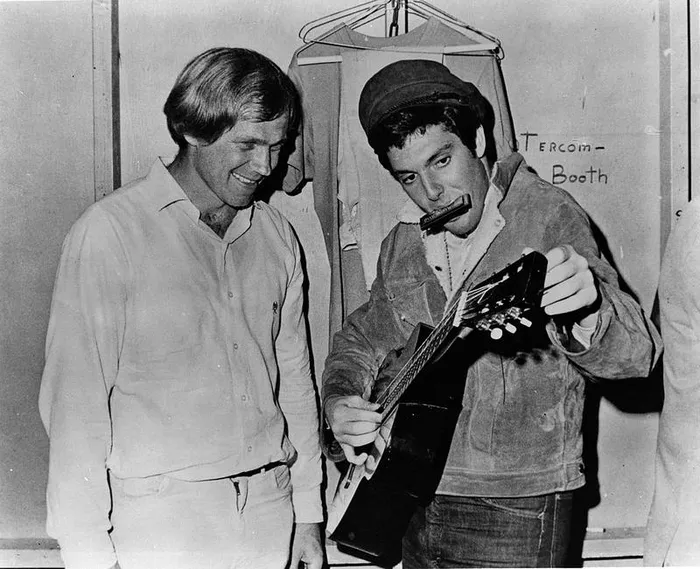In the tumultuous 1960s, music became a powerful tool for social and political commentary. Among the protest anthems that defined the era, “Eve of Destruction” stood out as a fervent outcry against war, injustice, and the impending doom of humanity. Barry McGuire, the passionate folk singer, delivered the song’s fiery message with unparalleled intensity. In this article, we delve into the profound impact of “Eve of Destruction,” exploring its creation, its resonance with the turbulent times, and its enduring legacy as a symbol of protest and social change.
I. Barry McGuire: A Voice of Conscience
Emergence of a Folk Icon: Barry McGuire rose to prominence in the early 1960s as a folk singer and songwriter. His powerful vocals and ability to convey raw emotion made him a standout artist in the burgeoning folk music scene.
Collaboration and Influence: “Eve of Destruction” was penned by P.F. Sloan, a talented songwriter who had previously worked with McGuire. Together, they crafted a timeless protest anthem that would resonate with generations to come.
The Power of Storytelling: McGuire’s ability to immerse himself in the narrative of a song brought depth and authenticity to his performances. “Eve of Destruction” became a platform for expressing the collective frustration and fear of a generation.
II. The Fiery Anthem “Eve of Destruction”
A Gripping Prelude: The song’s opening lines, “The eastern world, it is explodin’/Violence flarin’, bullets loadin’,” immediately capture the intensity of the times. McGuire’s commanding voice delivers these words with a sense of urgency that demands attention.
A Scathing Rebuke: “Eve of Destruction” addresses a wide range of issues, including war, racism, poverty, and the hypocrisy of those in power. The lyrics serve as a biting critique of the societal ills plaguing the nation.
Impactful Repetition: The song’s refrain, “You’re old enough to kill but not for votin’,” echoes the frustrations of the youth who were drafted to fight in the Vietnam War without the right to vote for their leaders. This repetition drives home the song’s core message.
The Weight of McGuire’s Voice: Barry McGuire’s impassioned delivery intensifies the impact of “Eve of Destruction.” His conviction and emotion resonate with listeners, making the song a rallying cry for those seeking change.
III. “Eve of Destruction” and the Turbulent 1960s
Soundtrack to a Revolution: The 1960s was a decade of upheaval and transformation, marked by civil rights struggles, anti-war protests, and a quest for social justice. “Eve of Destruction” encapsulated the frustrations and hopes of a generation on the cusp of change.
A Controversial Reception: Upon its release in 1965, “Eve of Destruction” sparked controversy and debate. Some praised its powerful message, while others saw it as too radical and inflammatory.
Becoming an Anthem for Activism: As the song gained popularity, it became an anthem for the anti-war movement and various civil rights campaigns. McGuire’s performance at rallies and protests solidified the song’s position as a symbol of dissent.
Persevering Relevance: Despite being written in the context of the 1960s, “Eve of Destruction” continues to resonate with new generations facing similar social and political challenges. Its themes of injustice and resistance remain tragically relevant today.
IV. Legacy and Ongoing Impact
Enduring Protest Anthem: “Eve of Destruction” has stood the test of time as a powerful protest anthem. Its emotive force continues to inspire activists and musicians alike to use their art as a means of social commentary.
A Call for Reflection: The song serves as a poignant reminder of the consequences of war and the importance of social justice. Its message remains a call for self-examination and collective responsibility.
Inspiration for Artists: Barry McGuire’s “Eve of Destruction” has inspired countless artists to use their platform to speak out against injustice and advocate for change. Its influence can be seen in protest songs across genres and generations.
Music as a Catalyst for Change: “Eve of Destruction” highlights the transformative power of music in shaping public discourse and fostering social awareness. It serves as a testament to the potential of art to ignite movements and challenge the status quo.
Conclusion
Barry McGuire’s “Eve of Destruction” remains a fiery protest anthem that encapsulates the fervent spirit of the 1960s. Its unyielding critique of war, injustice, and societal decay continues to resonate with listeners across generations. Through McGuire’s passionate delivery and P.F. Sloan’s evocative lyrics, the song transcends time and remains a poignant reminder of the enduring struggle for social change. As a symbol of protest and activism, “Eve of Destruction” stands as a testament to the power of music to inspire collective action and ignite the flames of societal transformation.

